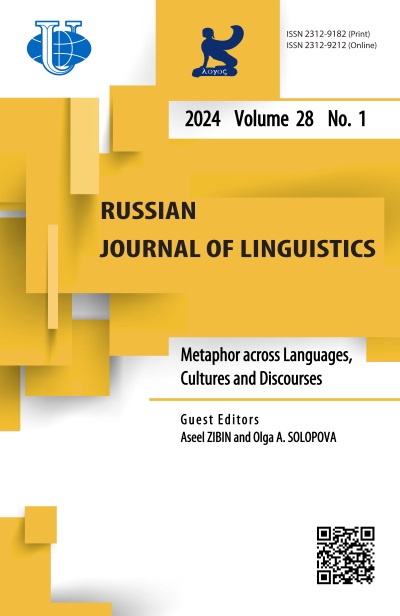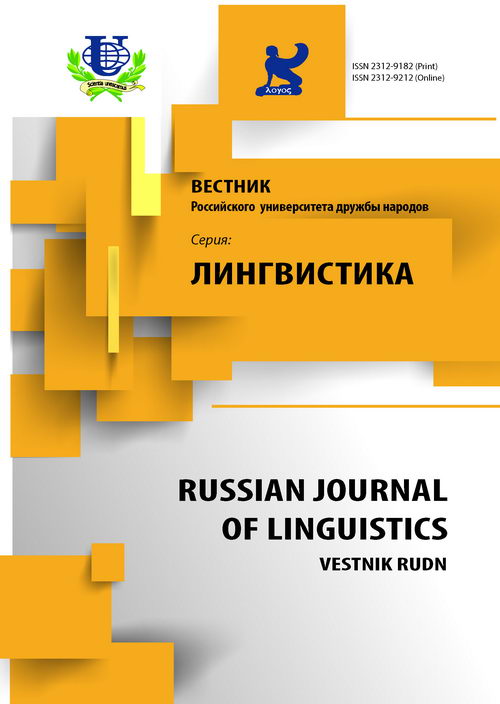The Place of Irony in the Speech Portrait of a Modern Politician
- Authors: Gornostaeva A.A.1
-
Affiliations:
- Moscow state linguistic university
- Issue: Vol 20, No 1 (2016)
- Pages: 57-76
- Section: Articles
- URL: https://journals.rudn.ru/linguistics/article/view/9659
Cite item
Full Text
Abstract
The article is devoted to the usage of irony in modern political discourse. Public speeches of modern Russian, English, and American politicians and political interviews served as material for the research. The aim of the research was to find out if irony is acceptable in political discourse and examine its influence on the speech portrait of a politician. The author's conclusion is that irony is acceptable, useful, and sometimes necessary in modern political discourse. Political debates in the modern world tend to look like talk-shows, and political information acquires the form of entertainment. This presupposes the usage of irony and humor in political discourse. Politicians use ready-made ironic utterances, as well as those created on the spot. There are also cases of unintended irony. Skillful usage of ironic mechanisms makes political speech vivid, audience-oriented, and convincing. Irony helps to put across one’s message and win the trust of the audience. This holds true for Russian as well as for English and American discourse.
Keywords
About the authors
Anna Aleksandrovna Gornostaeva
Moscow state linguistic university
Email: anngornostaeva@yandex.ru
General translation department Faculty of intercultural communication
References
- Алексеевский М.Д. Анекдоты от Зюганова // Антропологический форум. 2010. Т. 12. С. 1-36. URL: http://www.intelros.ru/pdf/Antropo_Forum_online/2010_12/09.pdf.
- Базылев В.Н. Политический дискурс в России // Политическая лингвистика. 2005. Вып. 15. С. 5-32.
- Баранов А.Н., Казакевич Е.Г. Парламентские дебаты: традиции и новации. М.: Знание, 1991.
- Гаврилова М.В. Лингвистический анализ политического дискурса. 2002. URL: http://www.polytanalysis.narod.ru/gavrilova3.html-60k.
- Горностаева А.А. Ирония как компонент английского стиля коммуникации. Монография. М.: ИПЦ «Маска», 2013.
- Дементьев В.В. Теория речевых жанров. М.: Знак, 2010. (Коммуникативные стратегии культуры).
- Ермакова О.П. Ирония и ее роль в жизни языка. Калуга: КГПУ им. К.Э. Циолковского, 2005.
- Карасик В.И. Языковой круг: личность, концепты, дискурс. М.: Гнозис, 2004.
- Кожемякин Е.А. Производство знания в политическом дискурсе: социально-эпистемологический взгляд // Политическая лингвистика. 2011. № 4(38). С. 52-56.
- Кронгауз М.А. Русский язык на грани нервного срыва. 2007. URL: http://www.rg.ru/ 2012/07/11/krongauz.html.
- Михалева О.Л. Политический дискурс: способы реализации агональности. 2004. URL: http://www.rus-lang.com/nir/conference/-14k.
- Чудинов А.П. Политическая лингвистика // Общие проблемы, метафора. Учеб. пособие. Екатеринбург, 2003.
- Шаховский В.И. Лингвистическая теория эмоций: Монография. М.: Гнозис, 2008.
- Шейгал Е.И. Театральность политического дискурса // Единицы языка и их функционирование: межвуз. сб. науч. тр. Саратов: Изд-во СГАП, 2000. Вып. 6.
- Alba Juez L. Irony and politeness // Revista Espanola de Linguistica Aplicada. Asociacion Espanola de Linguistica Aplicada. Volumen 10-1994-95. P. 9-16.
- Alba-Huez L. Irony as Inferred Contradiction // Вестник РУДН. Серия «Лингвистика». 2014. № 4. C. 140-153.
- Blank T.J. The Last Laugh. Eurospan, 2013.
- Bilig M. Laughter and ridicule. Towards a social critique of humour. Nottingham Trent University, Sage Publications, UK, 2005.
- Fialkova L., Yelenevskaya M. In Search of the Self: Reconciling the Past and the present in Immigrants’ Experience. Tartu ELM Scholarly Press 2013.
- Giora R. On our mind: Salience, context, and figurative language. New York: Oxford University Press, 2003.
- Larina T. Culture-Specific Communicative Styles as a Framework for Interpreting Linguistic and Cultural Idiosyncrasies| // International Review of Pragmatics. 2015. 7. P. 195-215.
- Lewis P. Cracking up. American humour in a time of conflict. The University of Chicago Press, 2006.
- Pocock J. The concept of a language and the metier d'historien: Some considerations on practice // A. Pagden ed. The languages of political theory in early - modern Europe. Cambr. etc.: Cambr. University Press, 1987. P. 19-38.
- Schutz C.E. Political humour from Aristophanes to San Ervin. Assossiated University presses, London 1977. URL: https://books.google.com.tr/books?id=Q7i40PY6AzgC&printsec= frontcover&hl=tr&source=gbs_ge_summary_r&cad=0#v=onepage&q&f=false.

















